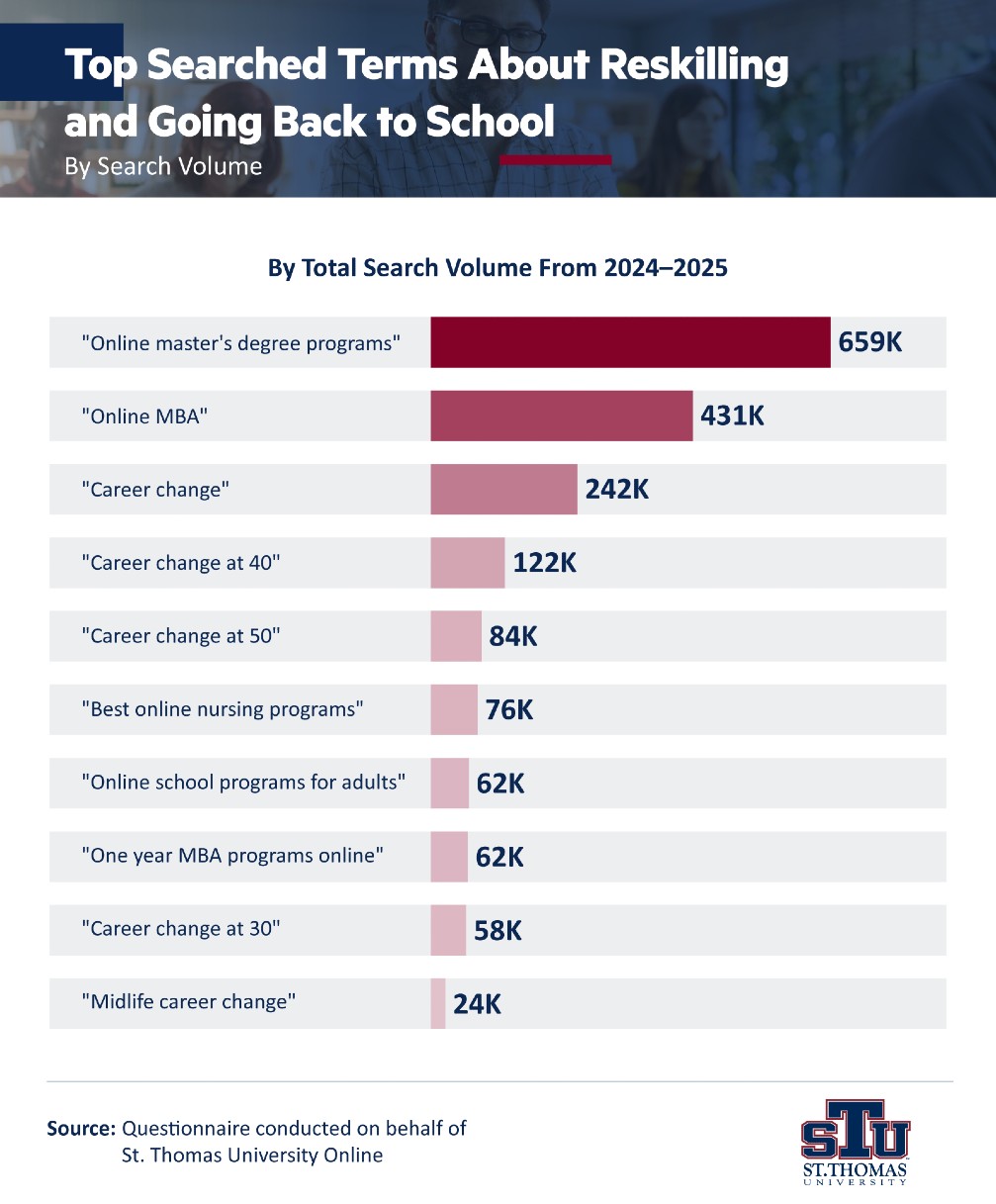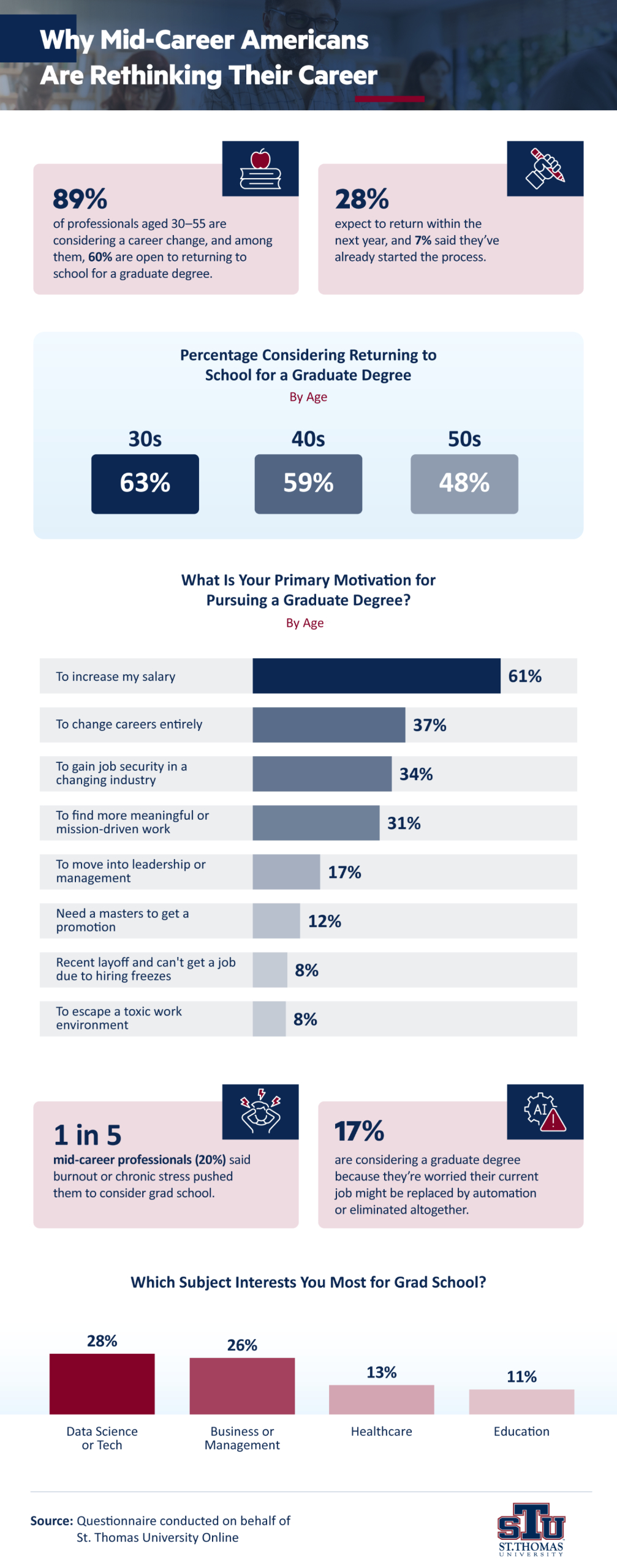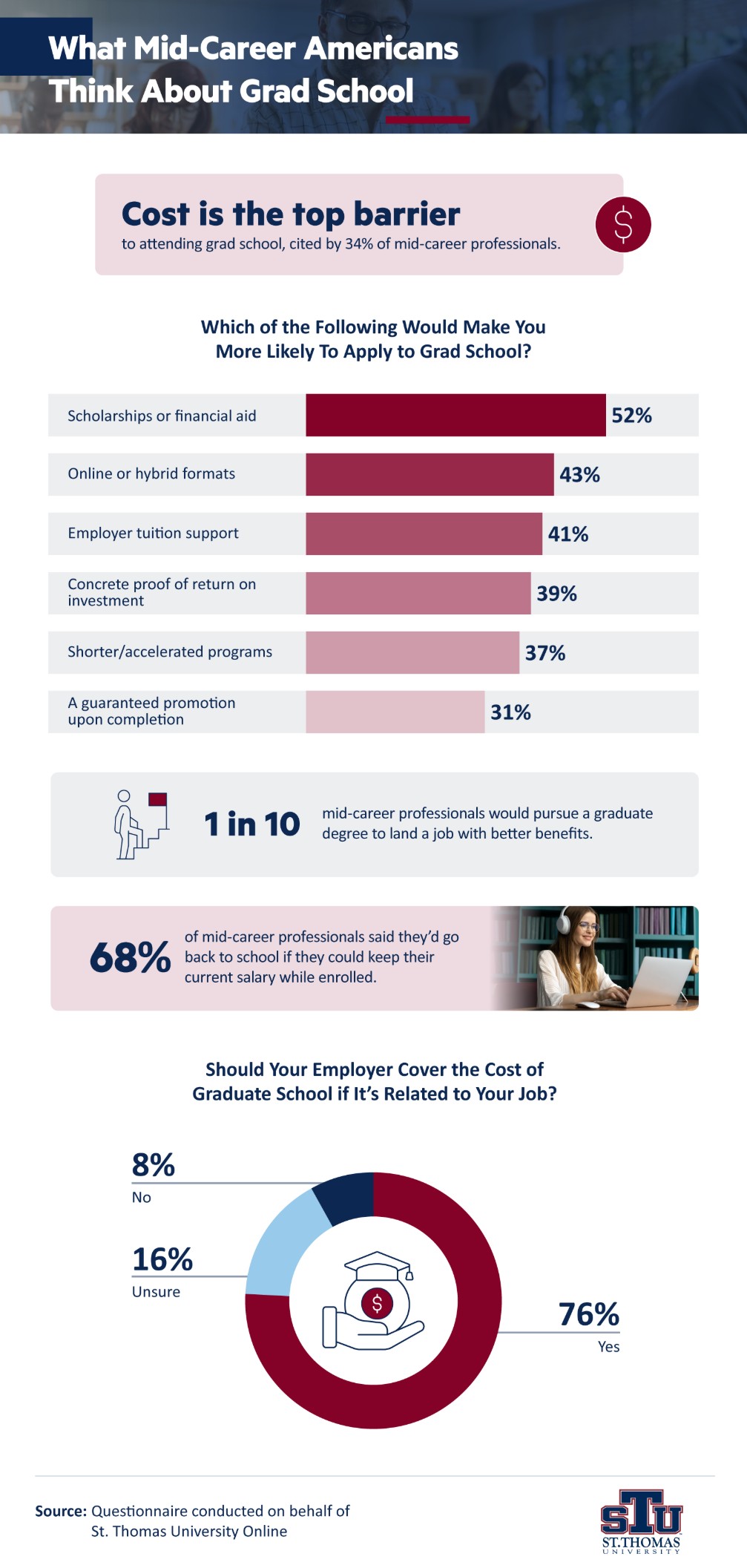Across the U.S., many adults are rethinking their career paths and considering heading back to school to unlock new opportunities. This article explores responses to a questionnaire of over 1,000 mid-career professionals and analysis of Google Trends search data to see where Americans are most eager to upskill.
The findings highlight which states and cities are seeing the most interest in going back to school, what motivates professionals to pursue graduate education and what’s holding them back. Whether you’re a teacher supporting adult learners or navigating your own career changes, these insights show how education continues to shape lives beyond the classroom.
Key Takeaways
- Massachusetts, Utah and New Jersey lead the nation in search interest for going back to school and changing careers.
- 89% of professionals aged 30–55 are considering a career change, and among them, 60% are open to returning to school for a graduate degree.
- 61% of mid-career professionals said they’d go back to school to earn more.
- 1 in 8 mid-career professionals interested in getting a graduate degree need one for a promotion.
- 1 in 10 mid-career professionals would pursue a graduate degree to land a job with better benefits.
- 35% of mid-career professionals say they feel stuck or like they’ve hit a ceiling.
- Nearly 1 in 3 mid-career professionals (31%) say they’d be more likely to pursue grad school if it guaranteed a promotion.
Who’s Ready to Upskill Across the U.S.?
Many Americans are searching for new learning opportunities. Based on Google search data from all 50 states, see where the interest in reskilling and returning to school is strongest.
States in the Northeast and Mountain West are leading in interest. Massachusetts topped the list with 684 reskilling-related searches per 100,000 residents. Utah followed closely with 676, and New Jersey wasn’t far behind at 626. Other high-ranking states included New York, Vermont, Rhode Island, Colorado, Maryland, Washington and Virginia.
Among the terms analyzed in this study, Americans have most often been searching for “online master’s degree programs.” Here are all of their most common queries.

Several cities also showed remarkable search interest. Atlanta ranked highest, with 2,872 searches per 100,000 residents. Miami and Seattle followed, with 2,204 and 1,858, respectively. The other major metros in the top 10 were Denver, Minneapolis, Baltimore, Boston, Tampa, Las Vegas, and Charlotte, North Carolina. Each city had over 1,100 searches per 100,000 residents, reflecting a strong curiosity about career reinvention and continuing education in these areas.
Career Change Ahead
Through the questionnaire, many mid-career professionals shared that they are contemplating their next move and that education will likely play a big role.

Nearly 9 in 10 Americans (89%) aged 30 to 55 said they were considering a career change. Of those, 60% were open to going back to school to pursue a graduate degree. The top motivator was the chance to earn more, with 61% citing salary growth as their main reason for further education.
When looking at the numbers by gender and age, 63% of men and 59% of women said increasing their salary was the primary reason to pursue grad school. Among Americans in their 40s, that number jumped to 66%, compared to 59% in their 30s and 52% in their 50s.
More than 1 in 3 mid-career Americans (35%) said they feel stuck or that they’ve hit a ceiling at work. Some (12%) were returning to college because a graduate degree could help them earn a promotion, while the same number planned to leave their current industry entirely.
Age discrimination was a major worry among those changing careers. More than half (58%) feared their age would affect their job prospects during the transition. The concern was lowest among those in their 30s (43%) but climbed steadily with age to 69% in their 40s and 88% in their 50s.
The Barriers to Going Back
Cost, confidence and past choices are shaping how professionals approach graduate school.

Past decisions are weighing on some respondents. Nearly one-third (32%) said they regret getting a degree in their undergraduate major. Among them, 36% said they would pick a different field if they could do it all over again. The biggest hurdle keeping people from pursuing grad school is affordability, as cited by 34% of respondents.
When asked what would make them more likely to attend grad school, most people pointed to scholarships and financial aid. However, 31% said a guaranteed promotion upon completion would be an excellent motivator. Another 1 in 10 would apply to a graduate program if it meant they could get better benefits from their next job. The majority (76%) agreed that an employer should cover the costs of the program if it’s related to your work for them.
Rethinking the Resume
More Americans are exploring new careers, and they’re open to learning new skills to get there. While concerns like cost, regret and ageism shape the journey, the overwhelming interest in upskilling reveals just how much mid-career professionals value education. As more adults consider the next step in their careers, schools, employers and communities have a key role to play in supporting lifelong learning and career growth.
Methodology
Risepoint surveyed 1,006 Americans aged 30–55 to explore their thoughts about graduate education and career reinvention. The age breakdown of respondents was as follows: 30s (51%), 40s (36%) and 50s (13%). Risepoint also collected Google Trends search volume data from 2024–2025 on searches made regarding career change and going back to school across the U.S. The data was collected in June 2025.
About St. Thomas University Online
St. Thomas University Online makes it easy for busy professionals to earn a degree without putting life on pause. With flexible online degree programs in areas like business, education and nursing, you can learn on your schedule and graduate faster than traditional routes. Supportive faculty and a focus on real-world leadership help you grow your skills and move forward with confidence.
Fair Use Statement
Noncommercial repurposing of this content is encouraged. When sharing, please link back to STU as the original source.